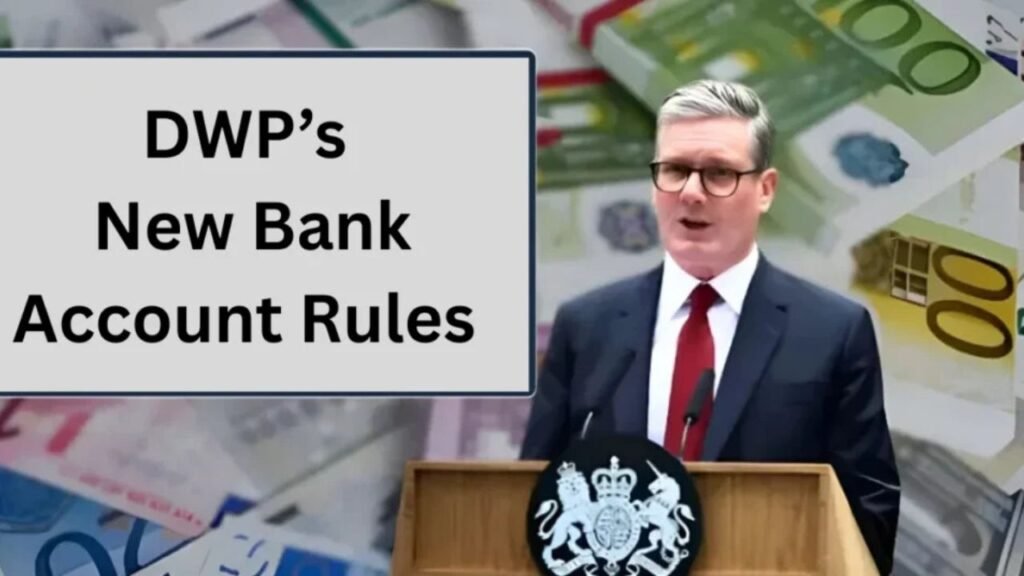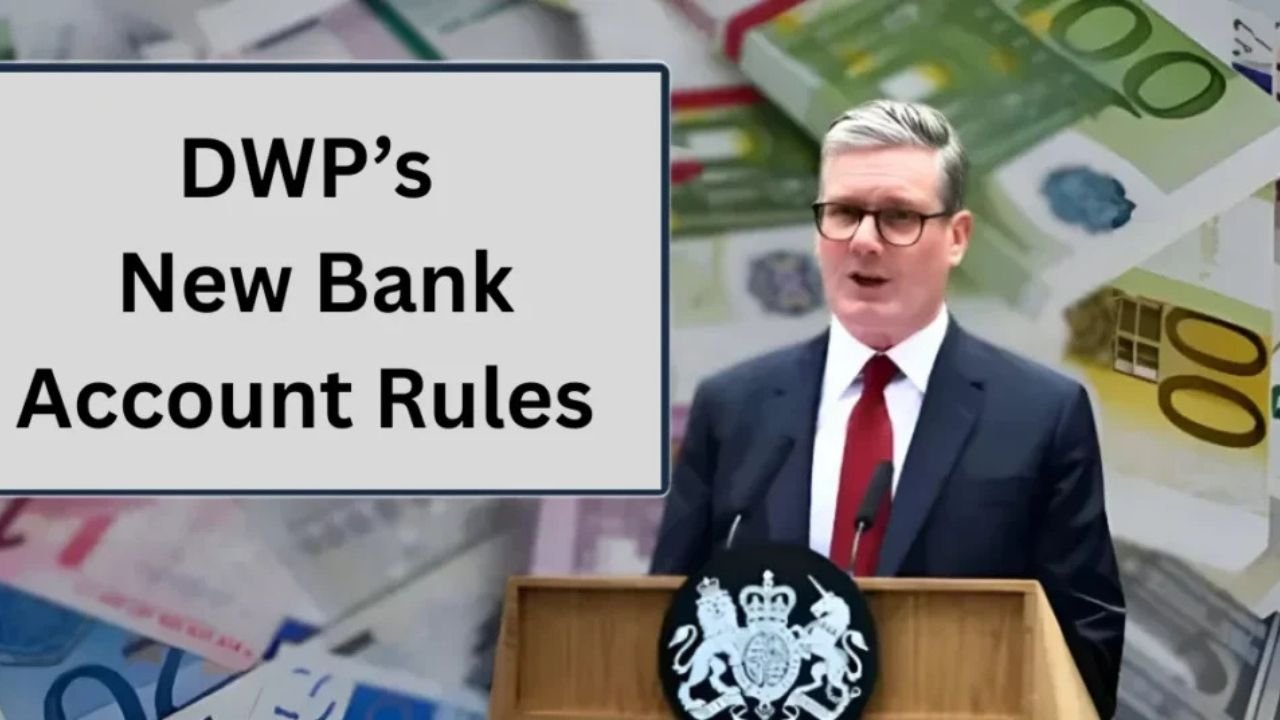DWP New Bank Account Rules 2025. As of 22 August 2025, the Department for Work and Pensions (DWP) is making significant changes to how payments to pensioners and benefits recipients are made. The new rules are aimed at ensuring pensioners are not targeted by fraudulent practices and that money is only paid into the correct accounts.
The changes will not be a problem for most people and should come naturally. However, delays may be experienced by those whose account details may not match with DWP records or those who have had their accounts lying idle. Because of this, it is worthwhile knowing more about the situation and making a few small steps right now to be ready.
Overview of New Bank Account Rules of DWP
| Category | Details |
| Article | DWP Pension Update |
| Type | Government Benefit |
| Country | United Kingdom |
| Scheme | State Pension, Pension Credit, Winter Fuel Payment, Carer’s Allowance, etc. |
| Department | Department for Work and Pensions (DWP) |
| Effective Date | 22 August 2025 |
| Key Focus | Fraud prevention, secure pension payments, and error reduction |
| Who’s Affected | Pensioners and benefit claimants with bank accounts in the UK |
The Reason for Changing the Rules
In recent years, professional fraudsters have improved at exploiting pensioners and benefit claimants. Older people have also had their money threatened by age-related scams relating to account takeovers and false claims.
The DWP is already enhancing its system to ensure:
- The money is paid to the right person at all times.
- It prevents fraudulent claims before they are made
- It reduces the errors and processing delays.
- Payments are as per the new UK banking regulations
- These are simply to keep pensioner funds safe and to provide better reliability.

The Main Changes Starting 22 August
In August, the following changes will occur:
- Bank Accounts Name Verification – The name on your bank account should be the same as the name the DWP has. Even minor variations, such as the absence of a middle name or spelling mistakes, were enough to produce a check.
- Active Account Requirement-In case you do not use your account for a certain time, it might be suspiciously flagged. This can be avoided by making small, frequent transactions.
- Joint Accounts- A joint account can still be used to make payments, but additional checks may be required to establish details.
- Change of Bank Details: In case of a change of bank, you need to inform DWP immediately. Otherwise, your payments may be missed.
- ID Verification During a Mismatch -There might be uncertainty about your account, and you might be required to undergo identity checks.
What Payments are Affected?
A large scope of payments will fall under the new rules, including:
- State Pension- The primary source of retirement income for the millions of beneficiaries. Payments may also stop until verification is done
- Pension Credit- This is an income-support scheme for pensioners with low incomes. Failure in matching the bank details may cause a delay in payments.
- Winter Fuel Payment – Assistance with winter bills. Payments may be withheld in case the account is marked as inactive.
- Carer Allowance-Supports those individuals caring or looking after a person with significant needs. Delays in payments might be experienced in case of checking the details
- Attendance Allowance – This is provided to such pensioners who require some assistance with their care. Subject to account name checks.
- Disability Benefits (DLA/PIP) -These benefits are paid to individuals with disabilities and include those of state pension age. These will require verified accounts.
How to Get Ready Before 22 August
Most pensioners won’t need to do much, but taking a few simple steps now will make sure everything runs smoothly:
- Check your details – Make sure your bank account name matches exactly with what the DWP has on file.
- Update any changes – If you’ve opened a new account, let the DWP know straight away.
- Keep your account active – Use your account regularly, even for small payments or withdrawals, to stop it from being flagged.
- Have ID ready – Keep proof of identity and address handy, in case you are asked to verify.
- Avoid last-minute bank changes – Switching banks just before August could increase the risk of delays.
What If Payments Don’t Arrive?
If your pension or benefit payment doesn’t reach you after 22 August, here’s what to do:
- Contact the DWP helpline as soon as possible
- Check that your bank account details match their records.
- Be ready to provide ID or any documents they request.
- Keep a written record of your calls or letters for reference.
Acting quickly will help resolve any hold-ups so you can get your payments back on track.
Why These Changes Are a Good Thing
Although the new checks may sound like extra hassle, they are designed to protect pensioners. Fraud targeting older people has been a growing problem, and these rules aim to shut down common scams.
The benefits include:
- Better protection from fraud and identity theft.
- Fewer errors, meaning more reliable payment dates.
- Peace of mind, knowing your pension is safer.
In the long term, these changes should make the whole payment system more secure and trustworthy.
Final Thoughts
The DWP’s new bank rule changes, coming into effect on 22 August 2025, mark a big step towards protecting pensioners’ money. While most people will barely notice a difference, those with outdated or mismatched bank details could see temporary delays.
The best way to avoid problems is simple: check your details now, update anything that’s changed, and keep your account active. That way, your State Pension, Pension Credit, and other benefits will continue arriving on time.
It may feel like an inconvenience today, but in reality, these rules are about making sure pensioners’ money is secure, because when it comes to your pension, both safety and punctuality matter.
| Home Page | https://sbbarristers.com/ |
FAQs for New Bank Account Rules of DWP
Do I need to open a new bank account for these changes?
No. You can continue using your existing account, but make sure the account name matches exactly with what DWP has on record.
What happens if my bank details don’t match the DWP records?
Your payments may be paused until you provide proof of identity and update your records.
Can I still use a joint account to receive my pension?
Yes, joint accounts are allowed, but you may be asked to confirm details for extra security.
What if my account has not been used for a while?
Inactive accounts could be flagged, so make sure to make small, regular transactions.
